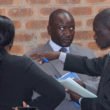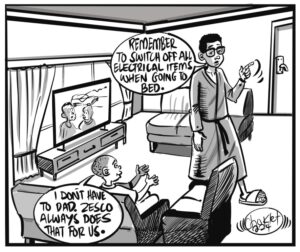LUSAKA Chief Resident Magistrate Lameck Mwale has refused to refer the case in which Lusaka photographer Cornelius Chellah Tukuta is charged with libel to the High Court for constitutional reference.
Magistrate Mwale dismissed the said application by Tukuta’s defence lawyers to refer the case to the High Court, as it lacked merit and further ordered that trial continue in the matter.
In this matter, it is alleged that Tukuta on May 26, 2020 in Lusaka, published defamatory matter affecting Chief Government Spokesperson Dora Siliya in the form of a video on Facebook that: “This Dora Siliya is hooking up girls, selling girls to the high-profile people so that men can be sleeping [with them], she is actually the highest of the highest professional prostitute. If Dora Siliya is refusing these allegations that she does not connect girls to high-profile people for sex, let her come.”
He had pleaded not guilty to the charge and trial commenced with Siliya testifying in the matter as the first prosecution witness.
However, when the matter came up for continued trial, Monday, Tukuta, through his lawyers Linda Kasonde, Mulambo Haimbe and Josiah Kalala asked the Court to refer the matter to the High Court for constitutional reference, pursuant to Article 28 (2) of the Constitution.
Tukuta wanted the matter referred to the High Court for determination of constitutional questions arising out of his arrest and his subsequent charge of libel.
He wanted the High Court to determine whether or not section 191 of the Penal Code Chapter 87 of the laws of Zambia, which criminalises expression was necessary in a democratic society, and whether or not his prosecution for libel was a contravention of Article 20 of the Constitution of Zambia, which protects freedom to hold opinions, receive ideas and information, freedom to impart and communicate the same without interference.
Tukuta also wanted the Court to determine whether or not section 191 of the penal code has a reasonable necessary limitation on the right to freely express an opinion and ideas as envisaged in Article 20 of the Constitution of Zambia.
The defence lawyers submitted that the right to freedom of expression was guaranteed in the Constitution and was integral to a democratic country, such as Zambia.
Kalala said the complainant in the matter, Siliya, was a Minister, who holds the portfolio of Chief Government Spokesperson and member of parliament for Petauke, adding that the statement that Chella was alleged to have made against her that she was a ‘high-profile prostitute’ was not investigated.
“The manner in which the police acted by arresting the accused was designed to intimidate him to stop him from commenting on how public officials conduct themselves and activities they participate in. The conduct of the complainant holding high public office can be scrutinised by the public,” the defence said.
However, State advocate Bob Mwewa urged the Court not to refer the matter to the High Court, arguing that Article 20 (3) (b) sets up limits on freedom of expression.
He said section 191 of the Penal Code was not in contravention of Article 20 of the Constitution.
“Article 20 which sets out freedom of expression also sets out the limits of freedom of expression in Article 20 sub-section three. These limitations of freedom of expression are not unique to Zambia,” Mwewa argued.
He said the constitutionality of criminal defamation had already been settled by the higher courts.
But in reply, the defence said it was a proper case for the Court to exercise its discretion to refer the issues to the High Court for determination.
And in his ruling, Magistrate Mwale denied the defence’s application on the basis that it had no legal basis on which it should be referred to the High Court.
“I do not say that the application is frivolous, but in my view, the application has no legal basis on which it should be referred to the High Court. Having found that the application lacks merit, I, hereby, dismiss it and order that trial continues,” ruled Magistrate Mwale, who then adjourned the case to October 22, 2020.












